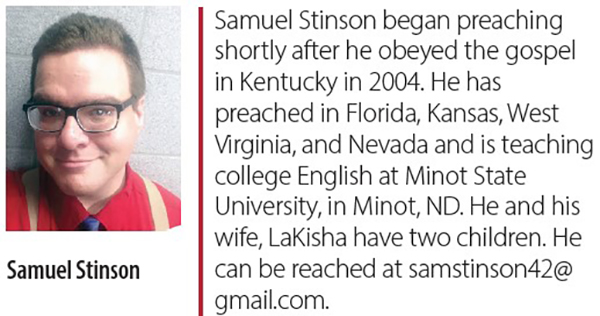OPEN ISSUE: Review of the New American Standard Bible, 2020 Update

For many of us, the NASB 1995 Update has been a reliable and trusted tool for studying God's message of salvation. How does the 2020 Update compare? What advantages or disadvantages does it possess?
Introduction
Sanctify them in the truth; Your word is truth (John 17:17, NASB 1995 & 2020).
In this article, I will review the New American Standard Bible, 2020 Update (NASB). I will discuss ten example changes that have appeared in the 2020 update, with comparison to the NASB 1995. I will conclude with my general recommendation for this 2020 version. In preparing to write this review, I decided to start by re-reading the 1977 Truth Magazine article review of the New International Version (NIV) written by our brother Luther W. Martin which is available online. The year 1977 was a simpler time, forty-three years ago, and was at the beginning of the firestorm that would soon erupt in response to the rise in popularity of the NIV and versions like it that used Eugene Nida’s translation philosophy of dynamic equivalence. On the spectrum of Bible translations, the NASB 2020 update is still a mostly literal translation, though it is located marginally closer to the dynamic equivalence side. With this point, some readers may ask, “Is the NASB 2020 still the most literal translation?” I would say no, but I would state that it is now instead, perhaps, the most accurate.
In the 1960s and 1970s, a change in modern languages occurred responding to political and social causes. This change often meant eliminating the use of the generic masculine pronoun as this type of usage became associated with sexist usage. In English this has meant removing instances in which the word man, or the pronouns he/him/his, when these inclusively refer to men and women. With contemporary English usage in view, the NASB 2020 update has joined a group of recent translations having a primary focus of being inclusive when it comes to gender in translation. While it has been suggested online that this method should be called being gender neutral, the Lockman Foundation website includes an article arguing that their approach should be instead called gender accurate. Gender accurate means using accurate and exclusive language when rendering their translation in English or other modern languages, even in the case where the original languages had used generic masculine pronouns.
Before examining the NASB 2020 update, I will provide a hypothetical example of what this gender accurate approach may look like in practice. Imagine that a translation of Acts 2:38 renders the text like this: “Peter said to them, ‘Repent, and each of you men and women be baptized in the name of Jesus Christ for the forgiveness of your sins; and you will receive the gift of the Holy Spirit.’” I have supplied the words men and women here, as Peter gives the command to repent, be baptized, and to receive the gift of the Holy Spirit not exclusively to just men or women, but both. That would be a gender accurate approach. Now some may object, as the italicized words are not literally in the Greek here in Acts 2:38. Yet, a quick search finds that Peter referred to men and women back in Acts 2:17-18 in citing the prophecy of Joel. So, the earlier context of the passage could be said to support the reading, even if the words are not literally there later in v. 38. If the reader objects to this approach, consider that this appears to be how the translators of the NASB 1977 and 1995 translated Ezekiel 13:23 by including the word women in that verse, since it appeared earlier in the chapter (cf. Ezek. 13:17-18). (see Endnote #1) In addition to being gender accurate, the NASB 2020 also updates some more archaic phrasing that appeared in the NASB 1995 (See Endnote #2).
Ten Example Changes in the NASB 2020 Update
On Facebook there is a reader group dedicated to the NASB that has featured participants sharing images with comparisons from various passages in both the NASB 1995 and 2020 versions. My list here is partially comprised of these, as well as other passages I have noted. The first term in each list is the 1995 version, while the second term is the 2020 replacement. The reader can follow along in the 1995 version and make these word substitutes to see the general differences in rendering in the 2020 version.
- Hebrews 10:24-25: v. 24: “let us” / “let’s”; “stimulate” / “encourage”; v. 25: “forsaking” / “abandoning”; “assembling” / “meeting together”
- Hebrews. 13:5: “forsake” / “abandon”
- Psalm 23:2: “makes” / “lets”
- Jeremiah 15:16: deletion of poetic “O” of address; “hosts” / “armies”
- 1 Peter 2:15-17: “men” / “people”
- Numbers 6:22-27: v. 23: “Thus” / “In this way”; v. 25: “make” / “cause … to”; v. 26: “countenance” / “face”
- Matthew 19:9: “immorality” / “sexual immorality”
- Psalm 42:5: deletion of poetic “O” of address; “have you become disturbed” / “are you restless”; “Hope in” / “Wait for”; Addition: “my God” at the end
- Micah 6:8: deletion of poetic “O” of address; “man” / “mortal one” (See Endnote #3)
- Galatians 3:26: “sons” / “sons and daughters”
Recommendation
Is the NASB 2020 update to be recommended over the NASB 1995 edition? To answer this question, I will mention that a self-selected poll on the above-mentioned NASB Facebook group asked participants which version they would prefer to stick with after considering the 2020 Update. The 1995 version received 116 votes, the 2020 version 65 votes, and the 1977 version was represented with 27 votes. With these responses in view, I do recommend the NASB 2020 translation as a meaningful placeholder in the ongoing conversation regarding Bible translations, though for some it will probably not become their primary translation.
While some readers may find the NASB 2020 better suited in approaching contemporary audiences in evangelistic efforts, I would not be surprised if there remains a larger group preferring to stay with the NASB 1995. The NASB 2020 is a reasonable compromise, providing more formally equivalent, gender inclusive translation options without the more dynamically equivalent, gender neutral phrasing of translations such as the TNIV.
I will close by saying that in keeping with the advice of brother Luther W. Martin in 1977, I would advise those who choose to use the NASB 2020 in personal study, devotion, preaching, teaching, or as a pew Bible, to exercise great care in establishing any doctrinal point using a single translation such as this without consulting both the original languages and other literal translations. Updates, while correcting pre-existing translation issues, can introduce new problems. In short, the use of gender accurate or inclusive translations in practice should be evaluated by first understanding the texts of the Bible in their original historical, grammatical, and rhetorical contexts.
Comparison Table
|
VERSE |
NASB 1995 |
NASB 2020 |
|
Heb. 10:24-25 |
(24) and let us consider how to stimulate one another to love and good deeds, (25) not forsaking our own assembling together, as is the habit of some, but encouraging one another; and all the more as you see the day drawing near. |
(24) and let’s consider how to encourage one another in love and good deeds, (25) not abandoning our own meeting together, as is the habit of some people, but encouraging one another; and all the more as you see the day drawing near. |
|
Heb. 13:5 |
(5) Make sure that your character is free from the love of money, being content with what you have; for He Himself has said, “I WILL NEVER DESERT YOU, NOR WILL I EVER FORSAKE YOU,” |
(5) Make sure that your character is free from the love of money, being content with what you have; for He Himself has said, “I WILL NEVER DESERT YOU, NOR WILL I EVER ABANDON YOU,” |
|
Psalm 23:2 |
(2) He makes me lie down in green pastures; He leads me beside quiet waters. |
(2) He lets me lie down in green pastures; He leads me beside quiet waters. |
|
Jer. 15:16 |
(16) Your words were found and I ate them, And Your words became for me a joy and the delight of my heart; For I have been called by Your name, O LORD God of hosts. |
(16) Your words were found and I ate them, And Your words became a joy to me and the delight of my heart; For I have been called by Your name, LORD God of armies. |
|
1 Pet. 2:15-17 |
(15) For such is the will of God that by doing right you may silence the ignorance of foolish men. (16) Act as free men, and do not use your freedom as a covering for evil, but use it as bondslaves of God. (17) Honor all people, love the brotherhood, fear God, honor the king. |
(15) For such is the will of God, that by doing right you silence the ignorance of foolish people. (16) Act as free people, and do not use your freedom as a covering for evil, but use it as bond-servants of God. (17) Honor all people, love the brotherhood, fear God, honor the king. |
|
Num. 6:22-27 |
(22) Then the LORD spoke to Moses, saying, (23) “Speak to Aaron and to his sons, saying, ‘Thus you shall bless the sons of Israel. You shall say to them: (24) The LORD bless you, and keep you; (25) The LORD make His face shine on you, And be gracious to you; (26) The LORD lift up His countenance on you, And give you peace.’ (27) “So they shall invoke My name on the sons of Israel, and I then will bless them.” |
(22) Then the LORD spoke to Moses, saying, (23) “Speak to Aaron and to his sons, saying, ‘In this way you shall bless the sons of Israel. You are to say to them: (24) The LORD bless you, and keep you; (25) The LORD cause His face to shine on you, And be gracious to you; (26) The LORD lift up His face to you, and give you peace.’ (27) “So they shall invoke My name on the sons of Israel, and then I will bless them.” |
|
Mat. 19:9 |
(9) “And I say to you, whoever divorces his wife, except for immorality, and marries another woman commits adultery.” |
(9) And I say to you, whoever divorces his wife, except for sexual immorality, and marries another commits adultery. |
|
Psa. 42:5 |
(5) Why are you in despair, O my soul? And why have you become disturbed within me? Hope in God, for I shall again praise Him For the help of His presence. |
(5) Why are you in despair, my soul? And why are you restless within me? Wait for God, for I will again praise Him For the help of His presence, my God. |
|
Mic. 6:8 |
(8) He has told you, O man, what is good; And what does the LORD require of you But to do justice, to love kindness, And to walk humbly with your God? |
(8) He has told you, mortal one, what is good; And what does the LORD require of you But to do justice, to love kindness, And to walk humbly with your God? |
|
Gal. 3:26 |
(26) For you are all sons of God through faith in Christ Jesus. |
(26) For you are all sons and daughters of God through faith in Christ Jesus. |
Endnotes
1 Thus, it could be said that the NASB was already somewhat gender accurate as far back as 1977, about 43 years ago.
2 If we imagine a spectrum that on one side goes from most literal and on the other end goes to least literal, the NASB 1995 would use the first item on the most literal side, while the NASB 2020 would use the second or third item in the list, while still on the most literal side.
3 One wonders, facetiously, why the 2020 translators did not simply decide to translate the word God as “divine one” to bookend “mortal one.” 
by Samuel Stinson

